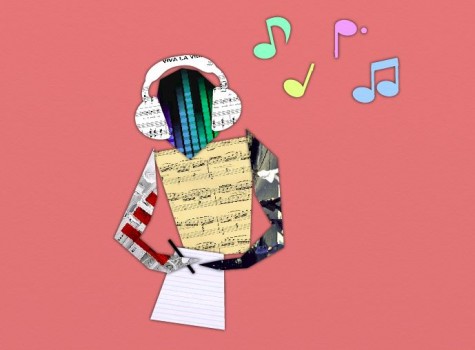Not magic, just music
November 1, 2014

Music has been found to improve productivity and state of mind.
Whether it’s rocking to Radiohead or jamming to Jay-Z, music undoubtedly has its effect on everyone. But what is that effect?
According to a CNN article published in 2013, not only can favorite bands really turn it up to 11, but they can also mellow a bad mood; they can rock and they can roll with it. A study reviewed in Trends in Cognitive Science concluded that music is one of the best anxiety alleviators.
The study was conducted with patients about to undergo surgery who were randomly given either music or an anti-anxiety medication. Throughout the surgery, patients who listened to music had lower cortisol levels and therefore less anxiety, suggesting a strong link between music and lowering stress.
Committing to learning to play the piano or taking up guitar can actually help raise a report card. According to a 2006 study published in the Journal of Educational Psychology by Glenn E. Schellenberg, PhD, the overall academic performance and even the IQ of children and teens can be increased by taking music lessons and listening to music. This study unveiled the parts of music that are key to academic proficiency, such as reading sheet music and just listening to some tunes, and increased the popularity of music schools and general music lessons.
[Music] can keep you focused.
— freshman Jak Kinsella
According to an article from Equinox magazine published in 2012, when using music as a study tool, the best choice is generally instrumental, easy-listening bands. Once the distraction of lyrics is removed, anything goes, and the choice of instrumental music is up to the listener.
There are students who believe that music helps them study. Jak Kinsella, a freshman, gave a solid confirmation that he liked music. According to Kinsella, music really lets one “express [one]self and [one’s] inner creativity,” and Kinsella listens to music when he does homework. Kinsella has also played guitar for 5 years, making him an example of musicianship.
Kinsella also notes that music helps relieve nervousness. “Listening to music before you take a test if you’re really nervous will help you,” Kinsella said, “it can keep you focused a little bit more.” He also listens to music before he swims, as sports fuel.
With more research, music could become a common treatment for a bad day or a tool for motivation. So after a bad day, put on a favorite song. When it’s difficult to sleep, put on a favorite song. When it’s time to be productive, put on a favorite song. To quote Bob Marley, “One good thing about music, when it hits you, you feel no pain.” Bob Marley knew it, and now there’s research to back it up, too. Music really is the best painkiller.